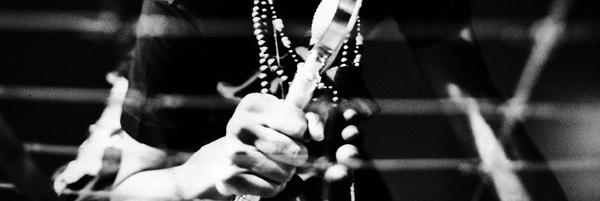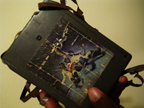On being futuristic and tangible at once: "Ness" and EYE2025*
The Scene
Some artists strain to look deeply into the future to escape the perceived orthodoxy of the present.
Others might enjoy the
What Is The Future?
The future as we live it is unassailable for its quality of entertainment. I love it, going back to "Danger, Will Robinson!" But it's cliché in its aesthetic -- detached demeanors, supra-human aliens (who still need space ships?), everything colored silver (even our hair), and the whole world easily comprehended on a touch screen.
However, on this 2011 earth the report card on the expected future is, in large part, gray. Take our biggest current metaphor: the digital world. 70% of the people in this world are unconnected and the remaining 30%, particularly in so-called developed countries deal with service that is spotty, expensive, and slow . As the acknowledged summary definition of "the future," digital is a solid statement on our silver fantasy. It is at once real and overestimated when it comes to intrinsic progress. We spend our digital time mostly ....playing games and waiting on Christmas-timed form factors, "iPad now in white" being rendered not as marketing but as news.
Overestimating our connected selves is the modern signature of mass culture. I think this is a consequence of the 30% of connected folks setting the public agenda for conversation. So what? Well, this is the mindset that creates our real futures and, by definition, informs our art if only by forcing it to respond to mass culture.
But, I wonder what would happen if we could resist that momentum and reorient our thought on the future. What if our future weren't so digital, connected, green, local, sustainable (and five other hep words)... but still managed to be futuristic, and even human?
Here is where I find the conversation of a young hip hop artist by the name of Ness to be worth considering. He's all about the future, but not as we know it. He has a futuristic take on the near future; call it a space of 15 years.
Introducing the Futurist
Ness is a veteran of hip hop, having done global rounds as a member of dead prez and the duo A-Alikes, the latter being part of the larger RBG family of which dead prez is also a member. So you won't be surprised to find that his future is politically charged, but he's extended the urgency by bringing the future much closer.
He speaks with a voice that moves quietly in and out of the ether, but the delivery comes straight out of a monotone gravel pit flying at you like a 4oz glove from the octagon.
His idea? EYE2025*. It's a concept that turns out to be an honest postmodern response to the fake silver future. (Man, I know you hate that word, postmodern, and I do, too; so let's talk about it.) I mean postmodern in an amped up temporal sense -- i.e. postmodernity with postmodern flair, but I don't want to keep walking toward that rabbit hole ... so postmodern it is, just not in the overused art/academic sense where anything off the path can catch that label.
Case in point: Hip hop itself. I challenge Professor Gates characterization of hip hop in The Anthology of Rap as a "a postmodern version of the African-American vernacular tradition."
Can it really be postmodern? Having growing up in hip hop (before the b-boy and graffiti were united with it to form a movement, before we acknowledged a difference between rap and hip hop because
Even in the abandon of pure party lyrics (try "old school" cut As The Rhyme Goes On), there is a focus on moving the crowd, but also a cultural comment on blackness that never leaves peripheral vision. From here we gain a full definition of modern Americana by an art form still sometimes excluded from it. The measure of hip hop is not only "is it true?" but also how it accesses truth found in a distinctly American context. Wack emcees find that out every day. A beatdown is not postmodern.
Ness' postmodernism simply "comes after" and "responds to" our modern concept of both the future and of hip hop.
ENTER: Ness ...on a bicycle.
"I don't need paper. The rhymes stay with me as I work them out where I spend most of my time: on a bicycle."
The bike as vehicle is very "now," but his work is what dispels it as fad, since the only way to be hip hop on a bike is to just be yourself, with no apology, and bring heat while you're riding. You'd sooner see a guy without tight pants in Williamsburg, Brooklyn than a hip hop artist with a bicycle as his life's centerpiece. The Bentley is still a favored mode. But this countercultural move isn't the navel-gazing type. It comes off as conviction. I take it as that.
Occasionally, we see conviction bubble up to a movement when somebody has one strong enough that it magnetically draws enemies and friends with irresistible angst and empathy. Others -- the giant middle -- are drawn, too, but stop short at the uniform ... those pants and an nyc faux-toking on American Spirit cigarettes while riding the evergreen wave of 'what's cool right now.' We need all of that -- a real root and the mimicry that validates it -- as the essential make-up of any movement.
But, of course, we're not at movement speed with hip hop and bicycles, the mohawked kids on bmx bikes notwithstanding. However, I see a few signs that make it a worthwhile thought experiment to scan the prairie. Ness touches a particular bundle of nerves that are base ingredients: futurism, hip hop, and the "occupy" spirit long before the tents went up.
I was introduced to him by actor and dj, DJ TAbu, who showed me his first EYE2025* salvo, "Pedalin." He sharpens his political angle to deliver part I of the vision:
"...set in Ratner Heights, (the area formerly known as Fort Greene/Clinton Hill/Downtown Brooklyn, now owned entirely by construction mogul/re-gentrification king Bruce Ratner). EYE2025*Chapter1 is a dystopic vision of the future, a future that is rapidly approaching. Blurring the lines between genres, the music twists and turns through sounds [on a] mission to bring to light the world of the have-nots, and send out a call to arms to rise up, educate and build community."
That's old school hip hop -- basic political agitation -- but it's also near future for a new age, especially if you live near the Atlantic Yards he's talking about, flashpoint for the Battle of Brooklyn.
On the bike... he's not preaching green or any of the typical syncretic consciousness: He's just living.
"When I was a kid, we talked about cars. In hip hop you always hear talk of cars but you never hear people rapping about bikes ... not motorcycles but bike bikes." Ness uses the bike to think and to get around. It's incidental that the bike is also a symbol for our newfound interest in stewardship of the planet.
But hip hop, in its essence, can't fear any given dispensation, even if it's fear of being uncool. So, it's must stay true, i.e. without adjectives. It's hip hop or it's not. Theoretically, you should be able to pull it off in a button-down oxford and Dockers. [Well, no. Not in Dockers.]
Being gratuitously green or "conscious" would quickly be discovered and properly given a small shelf with the other misfit toys.
I remember the birth of conscious hip hop, but couldn't fully sign on because, even though I agreed with some of the regenerated themes, it always seemed that the beats and poignancy got left behind in the name of saying nice things. De La Soul, Tribe Called Quest and others proved that you could add dimension and still be hip hop. 50 Cent, at the other end of the spectrum gives the most telling indictment, ingeniously mocking nice music feigning hip hop with, "I know exactly what I'm saying -- so I am conscious."
Now, what is the hip hop of Ness' EYE20205* in this light? It's how he speaks to our time, as hip hop must do.
[Back to The Past]
I hold in my hands an eight-track tape of the O'Jays' "The Year 2000," recorded in 1980. The 20 years separating that title from its release date don't
[Ness on The Future]
Ness pulls us closer by challenging our blind silver imagination. He calls out the 1985 film Back to the Future (which references 2012) for a grossly unfulfilled promise of flying cars and whatnot, noting that we're all still pretty much fixed to the ground.
So how about just thinking on the next 15 years, since we've been such crappy prognosticators on times farther out? Note that what differentiates Ness' 15 years from a common strategic time span is that we don't leave behind our futuristic minds. We just take the silver away.
Even Ness' daughter helps spark this intellectual curiosity. At home, he plays a game with her that channels a base element of hip hop: elementary school beats banged out on a lunchroom table. (Raise a fist if you did that!) They trade table beats and score each other after each set, starting with a number like 10,000, then 100,000, then on to some crazy large number, "a 100 million gazillion trillion." "By the fifth set she can't think of a bigger number," he says, "and, on one of these occasions she stopped to ask me, 'Daddy, do numbers ever stop?'" He then introduced her to infinity.
This is hip hop, and a view into the music that he calls "political education meets science fiction."
I'm obviously not talking as much about his music as his argument. I dig the music -- true to what for me are hip hop's signatures: beats, flow, and storytelling. But, it's the argument that calls my attention:
The future can be futuristic and tangible at once.
[Denouement]
This deliberate and canny leap to only a few days away is a funky data point. Contrast it to a couple of meaningful romps into the far future. I loved the moment Daft Punk landed hard on everybody's heads. I put Janelle Monae in this conversation, too. She has taken the far future and replaced the silver stuff with a throwback velvet flux capacitor. I see the near future as completing the proposition of the technical future, one that deals with any small or large unit of time ahead of us with purposeful imagination. Would love to hear Alvin Toffler's hip hop because, now that I think about it, Future Shock unified the futures like this, too.
With Ness, we have hip hop on a bicycle and a point of view that mines a classic theme: justice. It's just a data point, not a movement, but a point that could possibly drop us onto another plane as it forces an expanded view backward and forward by including the forsaken (and now pretty ugly) ground just in front of us. We should welcome that kind of thinking and test it. If it lasts, that's Policy as it changes the way we live, just like hip hop did when it first appeared.
P.S. No bike pic. As Lance said, It's Not About The Bike.
Photo Credits: ericjhenderson
Follow Eric J. Henderson on Twitter: www.twitter.com/ericjhenderson


No comments:
Post a Comment